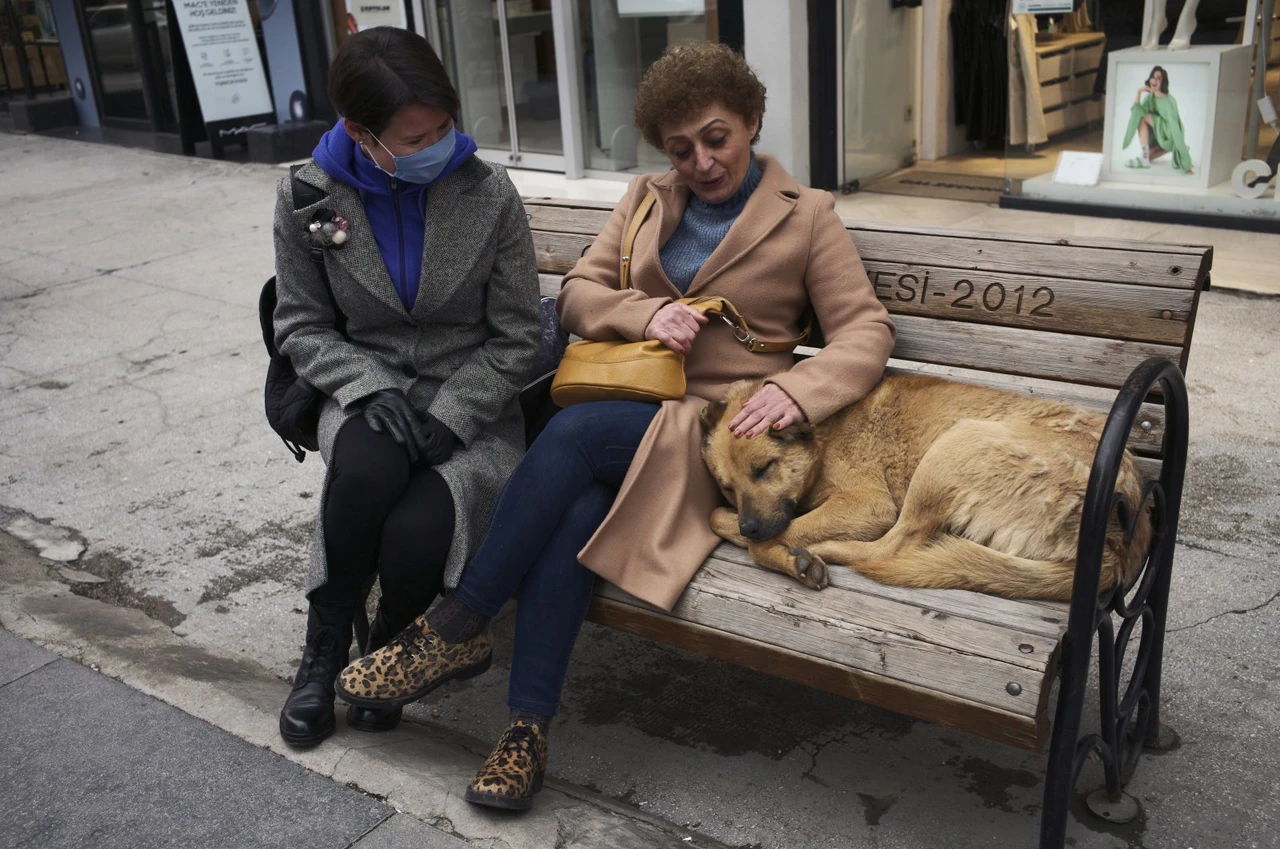Outcry over proposed stray animal law in Türkiye echoes Ottoman compassion
 Women chat while sitting on a bench, next to a stray dog, in Ankara, Türkiye, March 2, 2022. (AP Photo)
Women chat while sitting on a bench, next to a stray dog, in Ankara, Türkiye, March 2, 2022. (AP Photo)
On June 2, animal rights advocates across Türkiye took to the streets to protest a new draft law proposed by the ruling Justice and Development Party (AK Party).
The bill, which suggests euthanizing stray animals to control their population, has sparked significant controversy and backlash from the public and various animal rights groups.
Public outcry against AKP’s euthanizing stray animals proposal

Animal rights activists protest AKP’s new draft law regarding stray animals at Yenikapi, Istanbul, June 2, 2024. (AA Photo)
In Istanbul, a large crowd gathered at Yenikapi, Istanbul for the “Justice Rally.” Hundreds of citizens held signs reading “Don’t kill them, let them live” and “Stop the massacre, enforce the law.”
During the rally, the organizing committee made a powerful speech pointing to the threat to street animals and criticizing previous ineffective efforts that excluded animal rights defenders.
“The street animals we share our streets, parks, and neighborhoods with are under great threat,” the committee stated. They emphasized that any law including the rounding up and killing of stray animals is firmly rejected by society.
“The idea of rounding up and exterminating animals struggling with hunger, cold, and disease on the streets is neither acceptable to our conscience nor our sense of humanity,” the group declared.
The proposed bill by the AKP suggests that euthanasia would be conducted “compassionately and painlessly,” arguing that current methods like rehabilitation, sterilization, and shelters have failed to control the stray population.
The “Safe Streets and Right to Life Association,” which supports the move for euthanasia, claims that the increasing stray population poses risks, particularly to children.
Alternative solutions to the stray animal problem in Türkiye

Animal rights activists protest AKP’s new draft law regarding stray animals at Yenikapi, Istanbul, June 2, 2024. (AA Photo)
Animal rights activists strongly disagree. They argue that culling is not the solution. Critics point to the historical respect Turks have shown towards animals, recalling practices from the Ottoman Empire that protected and cared for animals. They stress that the solution lies in sustainable sterilization campaigns rather than extermination.
“Throughout history, our ancestors respected culture, the environment, and nature, ensuring the balanced utilization of all living beings,” they say. They criticize the proposed mass euthanizing of stray dogs, which they believe does not align with Turkish culture or beliefs. Instead, they advocate for methods like adoption and strict penalties for those who abandon animals on the streets.
Türkiye’s main opposition party objects euthanasia proposal

The backlash against the bill is not limited to animal rights activists. The main opposition party has also expressed strong objections to the euthanasia proposal. President Recep Tayyip Erdogan attempted to calm fears by stating that the goal is for all animals taken into shelters to be adopted, suggesting that euthanasia would only be a last resort.
Despite these assurances, the practicality of such a plan remains in question. Istanbul’s municipality has initiated a campaign to house stray dogs, and there is rising interest in adoption schemes. However, the scale of the problem is immense, with millions of stray animals on the streets. A poll by Metropoll revealed that only 2.7% of respondents support euthanizing stray dogs, indicating widespread public opposition to the proposed measures.
The debate over the bill continues as it is set to be presented to parliament. Animal rights groups, including the Turkish Bar Association and the Federation of Right to Life of Animals, have called for a comprehensive sterilization and rehabilitation campaign instead of extermination. They argue that a humane approach, involving all municipalities and adequate veterinary support, is the only sustainable solution.
Compassion for stray animals in the Ottoman Empire

During the Ottoman Empire, the treatment of stray animals was exemplary and rooted in Islamic principles and cultural values. The Ottomans saw it as a religious responsibility to care for all of Allah’s creatures, translating into a society that took animal welfare seriously.
Various foundations, shelters, and hospitals were established for the care of street animals. Birdhouses were built in courtyards of mosques, madrasahs, and palaces, and water pans were placed on gravestones for birds. Notably, the “House for Injured Storks” in Bursa, known as Gurabahane-i Laklakan, is considered the world’s first animal hospital, established to care for injured storks until they could be released back into the wild.
Ottoman law enforced penalties against cruelty to animals, and people who mistreated animals faced social ostracism and legal consequences. The Haci Seyyid Mustafa Foundation in Rumelihisarı even provided daily rations for stray dogs, demonstrating societal commitment to animal welfare. This historical context highlights a long-standing tradition of humane treatment towards animals in Türkiye.

However, not all was always harmonious. During times of modernization and Westernization, such as in the early 20th century, public opinion began to shift. Rapid urbanization and modernization created tensions regarding the presence of stray animals.
Notably, in 1910, tens of thousands of stray dogs were rounded up and abandoned on Hayirsızada (Sivriada), resulting in a tragic episode where many animals perished from hunger and thirst.
The importance of stray animals in modern Türkiye

In contemporary Türkiye, compassion for stray animals continues, especially in urban centers like Istanbul. Stray cats and dogs are common sights, and many Turkish people go out of their way to feed and care for these animals. Food and water are often left out on streets and in parks for strays.
Municipalities have initiated various campaigns to promote the adoption of stray animals and provide veterinary services. For instance, the “Semtpati” app helps facilitate the adoption of stray dogs by providing information and photos to potential adopters. In 2023, 375 dogs were adopted through this scheme.
Despite these efforts, the proposed bill by the AKP to euthanize stray animals as a population control measure has sparked significant controversy. The opposition to this bill is not just based on modern sensibilities but is deeply rooted in a historical consciousness that values compassion over cruelty. The Ottoman Empire’s legacy of animal welfare and the catastrophic events of Hayirsizada in 1910 serve as powerful reminders of the importance of humane treatment.
The proposal to euthanize stray animals has touched a raw nerve in Türkiye, a country with a rich history of humane treatment towards animals. The widespread opposition to the bill reflects the nation’s deep-seated values of compassion and care.



